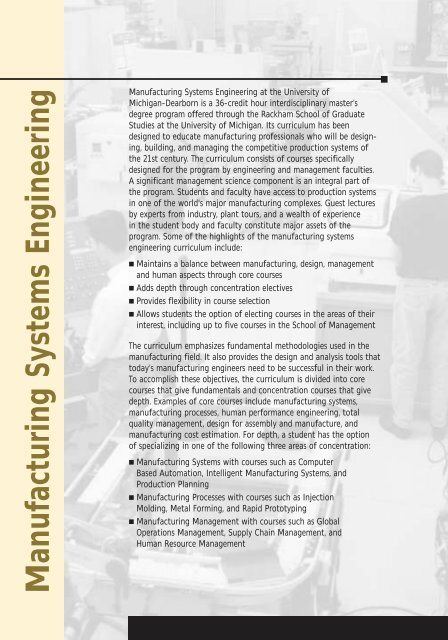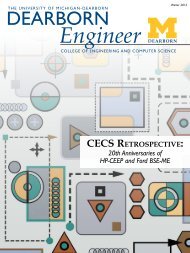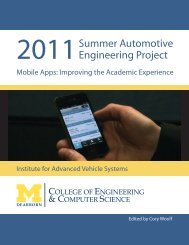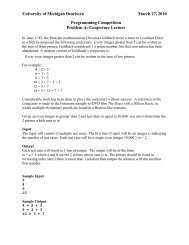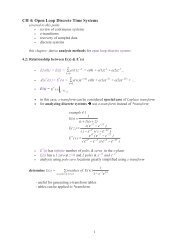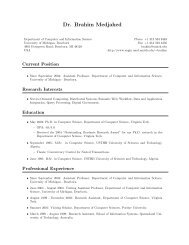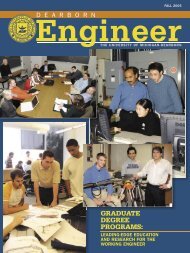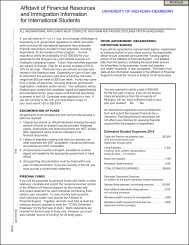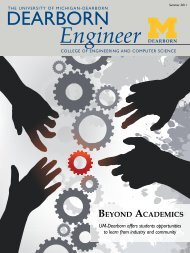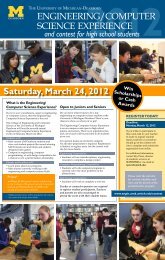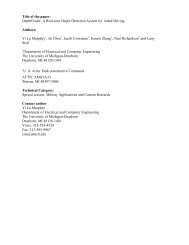UMD Interdisiplinatry programs - University of Michigan - Dearborn ...
UMD Interdisiplinatry programs - University of Michigan - Dearborn ...
UMD Interdisiplinatry programs - University of Michigan - Dearborn ...
Create successful ePaper yourself
Turn your PDF publications into a flip-book with our unique Google optimized e-Paper software.
Manufacturing Systems Engineering<br />
Manufacturing Systems Engineering at the <strong>University</strong> <strong>of</strong><br />
<strong>Michigan</strong>-<strong>Dearborn</strong> is a 36-credit hour interdisciplinary master’s<br />
degree program <strong>of</strong>fered through the Rackham School <strong>of</strong> Graduate<br />
Studies at the <strong>University</strong> <strong>of</strong> <strong>Michigan</strong>. Its curriculum has been<br />
designed to educate manufacturing pr<strong>of</strong>essionals who will be designing,<br />
building, and managing the competitive production systems <strong>of</strong><br />
the 21st century. The curriculum consists <strong>of</strong> courses specifically<br />
designed for the program by engineering and management faculties.<br />
A significant management science component is an integral part <strong>of</strong><br />
the program. Students and faculty have access to production systems<br />
in one <strong>of</strong> the world's major manufacturing complexes. Guest lectures<br />
by experts from industry, plant tours, and a wealth <strong>of</strong> experience<br />
in the student body and faculty constitute major assets <strong>of</strong> the<br />
program. Some <strong>of</strong> the highlights <strong>of</strong> the manufacturing systems<br />
engineering curriculum include:<br />
■ Maintains a balance between manufacturing, design, management<br />
and human aspects through core courses<br />
■ Adds depth through concentration electives<br />
■ Provides flexibility in course selection<br />
■ Allows students the option <strong>of</strong> electing courses in the areas <strong>of</strong> their<br />
interest, including up to five courses in the School <strong>of</strong> Management<br />
The curriculum emphasizes fundamental methodologies used in the<br />
manufacturing field. It also provides the design and analysis tools that<br />
today’s manufacturing engineers need to be successful in their work.<br />
To accomplish these objectives, the curriculum is divided into core<br />
courses that give fundamentals and concentration courses that give<br />
depth. Examples <strong>of</strong> core courses include manufacturing systems,<br />
manufacturing processes, human performance engineering, total<br />
quality management, design for assembly and manufacture, and<br />
manufacturing cost estimation. For depth, a student has the option<br />
<strong>of</strong> specializing in one <strong>of</strong> the following three areas <strong>of</strong> concentration:<br />
■ Manufacturing Systems with courses such as Computer<br />
Based Automation, Intelligent Manufacturing Systems, and<br />
Production Planning<br />
■ Manufacturing Processes with courses such as Injection<br />
Molding, Metal Forming, and Rapid Prototyping<br />
■ Manufacturing Management with courses such as Global<br />
Operations Management, Supply Chain Management, and<br />
Human Resource Management


